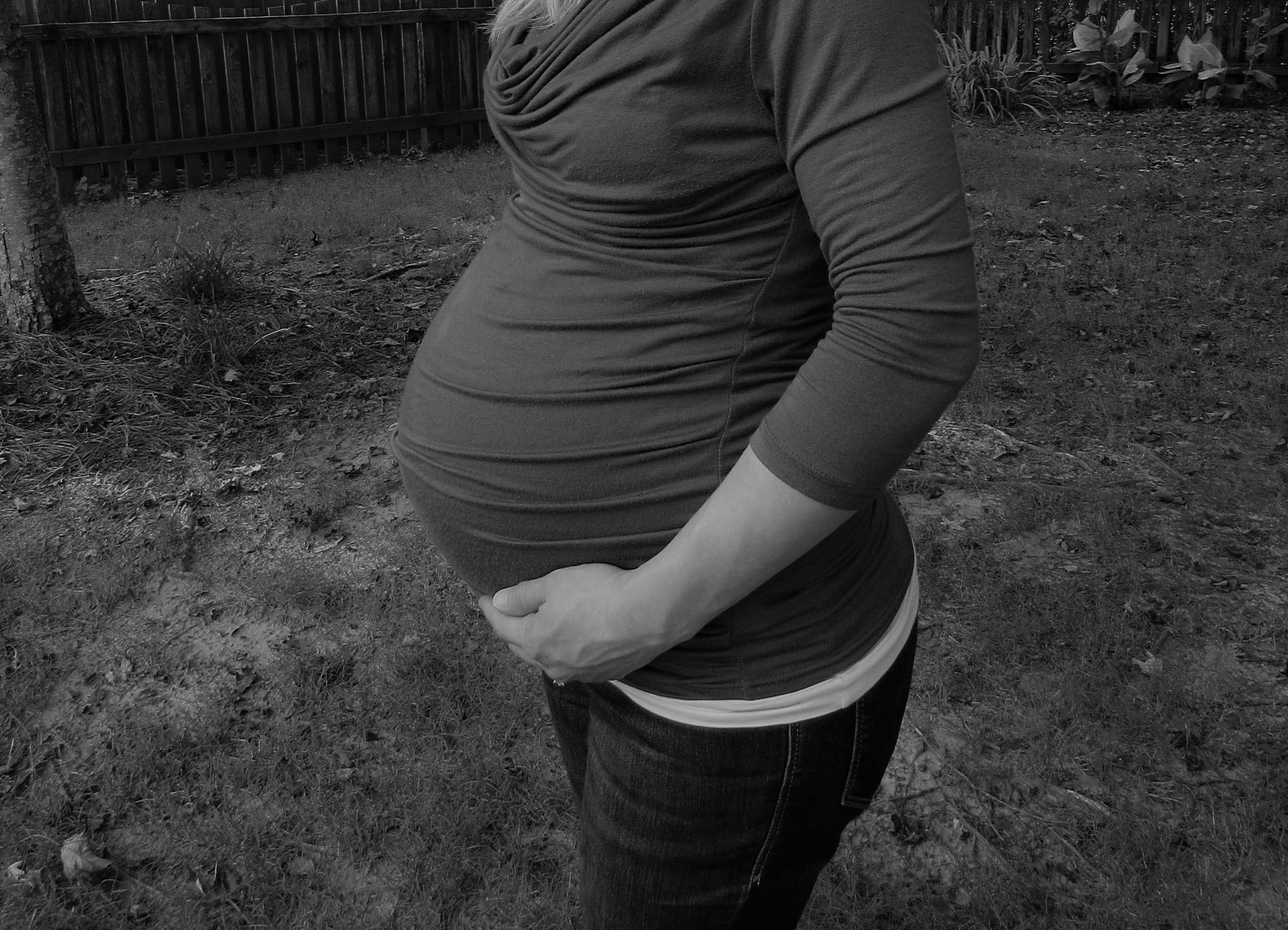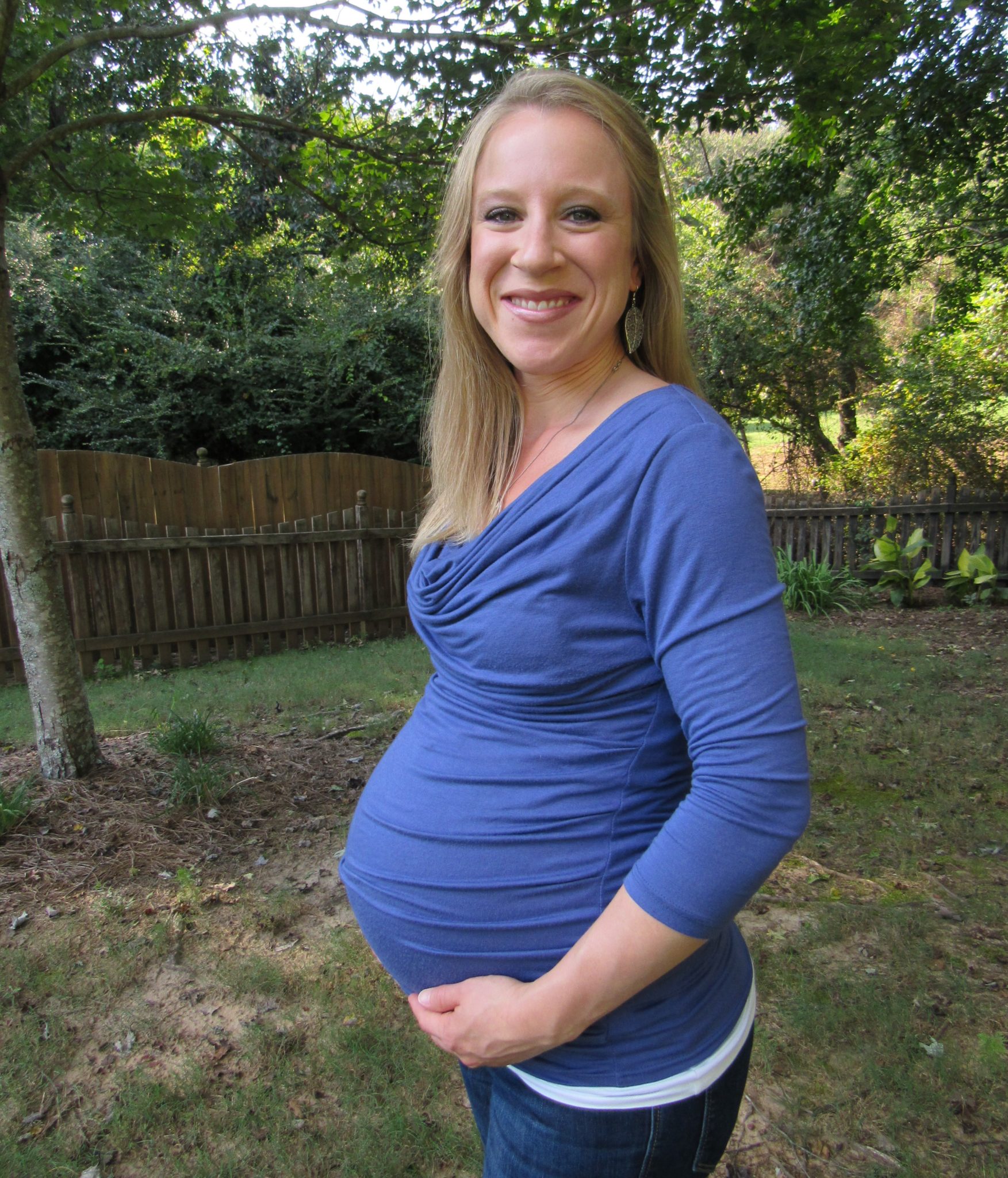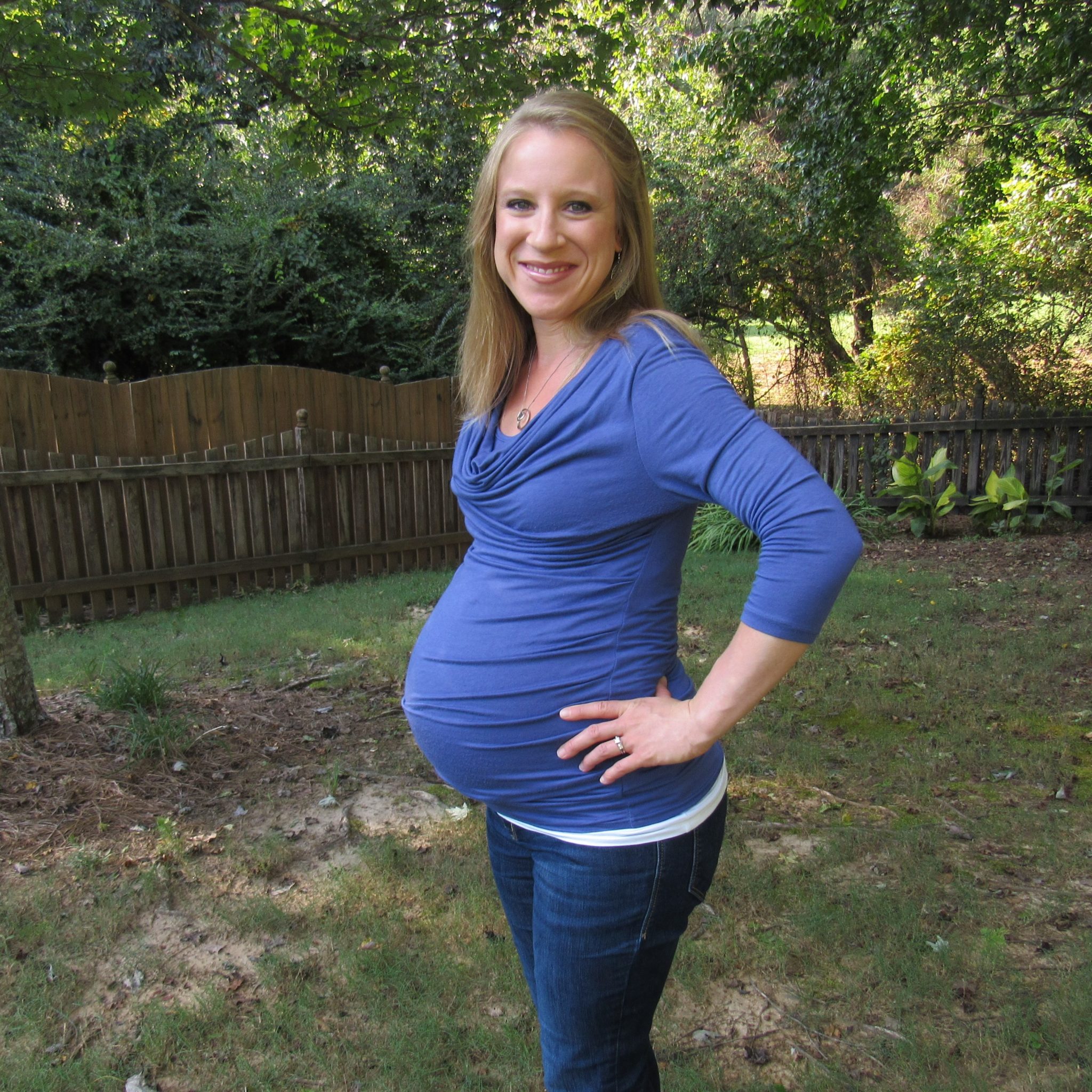Mortified. Day by day I watched purple veins pop to the surface of the inside of my left knee and spread down my calf like a spider web. It looked awful. I tried to ignore it, pretend it wasn’t there, but as the weeks of pregnancy passed by I realized this was something that was not going away.

At first, it was just like an ugly scar that wouldn’t vanish, but then it became uncomfortable. When I would get up in the morning and step out of the bed, I would feel a worrisome throbbing or pulsing sensation travel down my leg that would take 30-60 seconds to go away. Usually moving around (literally jogging in place with sleep still in my eyes) would help it subside a bit faster.
Finally, one day I asked my husband to take a look. While he works in prosthetics and orthotics, he has a wide knowledge of vein issues. He confirmed my dreaded suspicions. I was horrified. Would my leg really look like this the rest of my life? To be honest, I was completely naive and thought that varicose veins only occurred when you were a great-grandmother and no longer went to the beach, put on shorts or wore a skirt above your knees.
My pride made me bitter.
Of course, my husband tried to comfort and reassure me in all the ways a loving husband would, but I was just plain mad. I had always been in charge of my health. If I didn’t like something I could change it. But this was something I couldn’t change. The cleanest diet, best workout plan, appropriate sleep and smart stress management couldn’t make those expanding, vivid purple lines go away.
Only about 10 weeks into pregnancy when these appalling veins began to show themselves, I was determined to keep them hidden, even as we approached warmer weather months.
It took a couple of weeks for me to eat my pride, accept the reality, humble myself and seek out a professional opinion. Thankful for my husband’s connections in the healthcare arena, I soon had an appointment with an amazing physician at GHS Center for Venous and Lymphatic Medicine.
Pulling up my long maxi skirt to reveal the secret I had been hiding was a bit emotional for me. Dr. Darby was so sweet with a kind bedside manner and warm eyes. After a quick ultrasound to verify there were no clots, she stated,
“I have good news and bad news… The bad news is that varicose veins usually get worse during pregnancy and with consecutive pregnancies.” Then she said confidently, “The good news is that after pregnancy, I can fix it.”
It was a dose of encouragement and discouragement all in one pill, but I was certainly relieved that maybe one day, I would go to the beach or wear shorts again.
She made several recommendations about what I could do proactively during pregnancy to halt or minimize these ugly guys from getting worse. Considering the hot summer months ahead during pregnancy, Dr. Darby encouraged long, flowy palazzo pants and maxi dresses and skirts to keep cool.
Without any prompting, she pulled up her palazzo pants leg and showed off her candy pink knee high compression hose. You would have never known she was wearing them if she hadn’t shared, but she was actually proud to display that she practices what she preaches. Even though her varicose veins that popped up in her own pregnancy have been “fixed,” she continues to promote circulatory health by becoming an advocate and model to her patients.
This particular health issue was nothing I had asked for, deserved or a result of my own health behaviors. But it was mine to own. Decidedly, I began my own personal research on this unspoken topic of varicose veins during pregnancy. There is a stigma, an idea that after pregnancy within a few weeks everything should just ‘pop’ back into place.
Women talk about a lot of issues during pregnancy but varicose veins aren’t one of them. It feels hush-hush. But, I decided if I was going to bear those glory scars to have another healthy baby, I would also educate and champion other women who were also wondering if they could ever feel sexy again.
Let’s begin with the basics…

What are varicose veins?
These are twisted, enlarged veins near the surface of the skin. They develop most often in the legs and ankles, but during pregnancy, can also occur in the groin, vagina, and buttocks. Hemorrhoids are another type of varicose vein that occurs in the areas of the rectum or anus.
When veins are functioning well, the valves open and blood volume is pushed back from the legs to towards the heart. But when an upward flow is prevented, blood pools in the veins causing excessive pressure which can lead to swelling of the veins and discomfort.
According to the Department of Health and Human Services, 50-55% of women and 40-45% of men in the United States suffer from some type of vein problem. The Journal of Circulation claims that 23% of Americans have varicose veins in an article published in 2014.
Why do they occur during pregnancy for some women?
During pregnancy, blood volume increases while the rate at which your blood flows from your legs to your pelvis decreases. This puts pressure on your veins. Other reasons include:
- Hormonal changes
- Pressure on the inferior vena cava from the growing uterus
- Genetics- if you mom had them, you might too
Will they go away or fade?
The very good news is that according to the American Pregnancy Association and at the advisement of my physician, varicose veins usually fade or go away within 3-12 months following delivery. This gives your body time to regulate hormones, lose pregnancy weight and allow blood volume to normalize.
However, it is wise to schedule an appointment with a vein specialist before and after you deliver to ensure that your circulatory system is working well, no blood clots are present, and no further damage is occurring to your legs.
By meeting with a physician, they are able to assess and advise on treatment options that can relieve pressure to prevent the issue from getting worse. During my appointment, they also took photos of my legs (not the loveliest pictures!) to provide visual evidence to insurance. If additional treatment or interventions are necessary post-delivery, it is smart to have documentation and photos of the pregnancy varicose veins.
What are the long-term consequences of varicose veins?
If vein issues are left untreated, varicose veins can eventually lead to ulcers, bleeding, painful inflammation and blood clots. A healthy circulatory system is part of a healthy body!
In addition to being quite unattractive, they are also quite uncomfortable! Some common complaints about varicose veins:
- Aching
- Feeling of heaviness or fatigue in legs
- Tenderness
- Pain
- Itching
Personally, I experienced a lot of tenderness (felt like a bruise that wouldn’t go away), heavy feeling legs, and occasional itching. In addition, when getting up from bed each morning, there was a throbbing sensation pulsing through my legs that could last up to 30-60 seconds.
What can you do during pregnancy to help?
Taking a proactive approach is key to feeling good and not allowing this issue to ruin your self-esteem. You can maintain your pregnancy glow even if you have purple spider veins tattooed on your legs!
Maintaining healthy circulation is essential throughout pregnancy. These are some you can do:
- Exercise regularly– Your heart pumps blood to all your limbs and exercise helps keep circulation working properly.
- Gain weight at a healthy rate– All women need to gain weight during pregnancy for a healthy baby. Talk with your physician, dietitian, or midwife about how much weight is appropriate for you. However, gaining at a steady, gradual pace is very important to prevent excessive pressure at any one time.
- Avoid sitting or standing for long periods of time- Get up and stretch if you have been sitting a while. Take a short break and sit down if you stand a lot.
- Avoid wearing high-heeled shoes- Flats or low-heel shoes work your calf muscles more, helping push blood back up into your legs.
- Avoid crossing your legs while sitting
- Elevate your legs when you are able- This allows gravity to help get blood flowing back towards your heart.
- Sleep on your left side to reduce pressure on your inferior vena cava.
- Wear compression hose (like these) to help stimulate blood flow up the legs and towards your heart.
Other options pregnant women can consider include a Prenatal Cradle. This flexible device helps hold up the growing abdomen and is worn under clothing. It relieves pressure on the pelvis and back which can help blood flow improve during pregnancy.
There is also a similar device specifically created to relieve pressure in the vagina. These can be helpful for women who have vulvar varicosities (varicose veins occurring in the vaginal area).
The primary purpose of all of these techniques and tools is to help relieve pressure so that your body and circulatory system can function properly pushing blood back up your legs towards your heart.
Most physicians would recommend following most if not all of these methods to prevent further dysfunction of your veins during pregnancy, although some of the specific devices may or may not be applicable to your diagnosis.
Can I do anything nutritionally to help improve varicose veins?
- Avoid foods high in sodium to maintain a healthy blood pressure. Eating a diet rich in fruits, vegetables, low-fat dairy and whole grains boosts your body’s intake of magnesium, potassium, and calcium,- all nutrients which help regulate blood pressure (DASH eating pattern). Remember that most fast food, processed foods, and restaurant foods are extremely high in sodium.
- Consume adequate fiber and water. Straining to have a bowel movement puts more pressure on your veins and can cause a hemorrhoid to form. But especially if you are already experiencing hemorrhoids, this is one recommendation worth following! You can help maintain a healthy gastrointestinal tract and avoid additional pain and discomfort by choosing foods naturally high in fiber including whole grains, beans, peas & legumes, whole fruit, and vegetables, as well as nuts and seeds.
- Eat a diet rich in antioxidants & flavonoids. These plant super-heroes help practically every part of the body, including your veins! All the more reason to load up half your plate with veggies and fruit.
NOTE: During my appointment with Dr. Darby, we discussed a specialized supplement with high concentrations of bioflavonoids that is on the market and specifically designed to treat venous insufficiency. It is advertised as a tool to include along with proactive measures like weight loss, compression hose, exercise, etc. Dr. Darby advised me that she is still learning more about the research and supplement as to whether she will regularly advise patients to use this product.

If you feel plagued with varicose veins now (during pregnancy) or have them to show from previous pregnancies, you are not alone! I completely understand the frustration, self-esteem issues, and feeling of helplessness. BUT, there are many options for you to pursue (along with me!) that can dramatically help!
Don’t miss my follow-up post next week that will provide an in-depth look at treatment and intervention options during pregnancy AND post-delivery for varicose veins. I will share some of my own real-life pregnancy experiences testing out Medi compression hose and the PF Press (for vulvar varicosities). You will also find out exactly what you need to know about options you can discuss with a physician post-delivery to reclaim your beautiful legs and regain your confidence.
“You are altogether beautiful, my darling; there is no flaw in you.” –Song of Songs 4:7 (NIV)
A woman’s body is stunning and awe-inspiring. She can nurture a baby in the most intimate, loving way, birthing new life. We don’t have to live with the embarrassment or stigma from changes that occur to your body during pregnancy.
Educate yourself.
Be proactive.
Make choices that promote confidence.
And, celebrate your beautiful and amazing body!
TRUTH: Her children arise and call her blessed; her husband also, and he praises her: “Many women do noble things, but you surpass them all.” Charm is deceptive, and beauty is fleeting, but a woman who fears the Lord is to be praised. Honor her for all that her hands have done, and let her works bring her praise at the city gate. –Proverbs 31:28-31
NOTE: This is NOT a sponsored post. Thank you to Medi and It’s You Babe for allowing me to test out the products provided. All opinions are my own.
